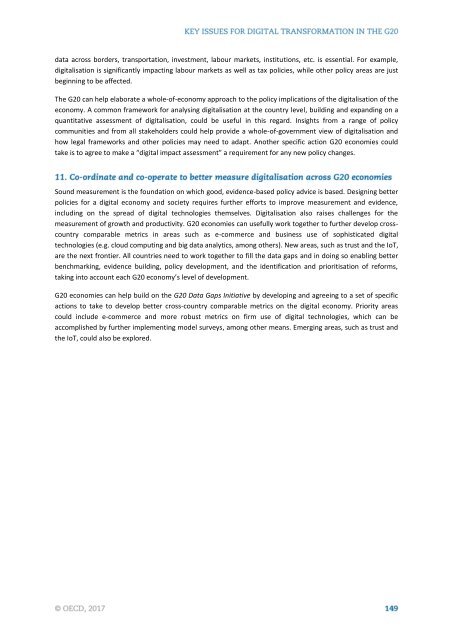KEY ISSUES FOR DIGITAL TRANSFORMATION IN THE G20
2jz0oUm
2jz0oUm
Create successful ePaper yourself
Turn your PDF publications into a flip-book with our unique Google optimized e-Paper software.
data across borders, transportation, investment, labour markets, institutions, etc. is essential. For example,<br />
digitalisation is significantly impacting labour markets as well as tax policies, while other policy areas are just<br />
beginning to be affected.<br />
The <strong>G20</strong> can help elaborate a whole-of-economy approach to the policy implications of the digitalisation of the<br />
economy. A common framework for analysing digitalisation at the country level, building and expanding on a<br />
quantitative assessment of digitalisation, could be useful in this regard. Insights from a range of policy<br />
communities and from all stakeholders could help provide a whole-of-government view of digitalisation and<br />
how legal frameworks and other policies may need to adapt. Another specific action <strong>G20</strong> economies could<br />
take is to agree to make a “digital impact assessment” a requirement for any new policy changes.<br />
Sound measurement is the foundation on which good, evidence-based policy advice is based. Designing better<br />
policies for a digital economy and society requires further efforts to improve measurement and evidence,<br />
including on the spread of digital technologies themselves. Digitalisation also raises challenges for the<br />
measurement of growth and productivity. <strong>G20</strong> economies can usefully work together to further develop crosscountry<br />
comparable metrics in areas such as e-commerce and business use of sophisticated digital<br />
technologies (e.g. cloud computing and big data analytics, among others). New areas, such as trust and the IoT,<br />
are the next frontier. All countries need to work together to fill the data gaps and in doing so enabling better<br />
benchmarking, evidence building, policy development, and the identification and prioritisation of reforms,<br />
taking into account each <strong>G20</strong> economy’s level of development.<br />
<strong>G20</strong> economies can help build on the <strong>G20</strong> Data Gaps Initiative by developing and agreeing to a set of specific<br />
actions to take to develop better cross-country comparable metrics on the digital economy. Priority areas<br />
could include e-commerce and more robust metrics on firm use of digital technologies, which can be<br />
accomplished by further implementing model surveys, among other means. Emerging areas, such as trust and<br />
the IoT, could also be explored.


